
You have to spend money to make money – so goes the conventional wisdom. But this is not just good advice for the entrepreneur looking to expand their business. It’s a legal and practical necessity to establish your business in the first place.
New business owners must shell out for approvals, licenses, permits, and inscriptions. Governments often require a business to have a paid-in minimum capital requirement – a set amount of cash in the bank. These processes are not just expensive but time-consuming and complicated. For example, before legislation to simplify start-up procedures and stimulate greater levels of entrepreneurship, Saudi businesses had to pass through 13 procedures and have 1,057% of income per capita in the bank before opening up shop.
The World Bank’s Doing Business project keeps figures on the cost and procedures you need to start a small- to medium-size limited liability company in every country. BusinessFinancing.co.uk converted the figures to US dollars and compared them to the local average income so we could map the cost and affordability of starting a business around the world. We found:
- The United Arab Emirates is the most expensive country to establish a business, with start-up costs of $7,443.51.
- There are no fees to start a business in Rwanda for the first two years, and in Slovenia the only ‘cost’ is a capital requirement of €7,500 with no fees.
- Starting a new business is least affordable in Congo, where $1,232 in fees equates to 2,554% of the average monthly income.
- In Kazakhstan it takes just 2% of the average monthly income ($12 against $531) to start a business.
Click on the image to open the map in full size
How Affordability of Starting a Business Varies from Country to Country
Low wages and substantial fees make it a challenge to start a business in much of Africa. The average monthly pay in Congo is just shy of $50, putting the $1,232.08 in start-up fees out of reach for most independent entrepreneurs. A similar – though not quite so drastic – disparity exists in the Central African Republic, Chad, and Mali, as well as further afield in Haiti, Yemen, and Syria. Suriname in South America has slightly higher wages, but higher fees put Surinamese start-ups in a similar position.
Click on the image to open the map in full size
But not all low-waged entrepreneurs suffer this fate. In Rwanda (monthly income $51), fees are waived for the first two years to allow businesses to get started. The income in Azerbaijan is similar to Suriname, but fees are just $10.59 or 4% of monthly income. The UK has the best of both worlds: fees of just $17 (£12, plus 1% of the company’s capital and 2% of the company’s share capital), against an average income of $2,985.42/month.
Italy is Europe’s Most Expensive Place to Start a Business
There are 11 countries in Europe with business start-up fees of $1,000+, but they all have an average monthly wage of more than $2k. That’s great in a country like Norway or Switzerland, where a paycheck of around $5.5k covers fees four times over. But not so affordable in Italy, where Europe’s highest start-up fees ($4,895) are double the $2,403 monthly income.
Click on the image to open the map in full size
At the other end of the scale, 12 countries have fees of less than $100. Slovenia has no start-up fees – although you need €7,500 ($9,168) in your business account to launch. The UK is among the cheapest places to start a business. The £12 fee is to file for registration with Companies House.
Affordable Entrepreneurship in the US
Starting a business in the US is not cheap ($725), but it’s not extortionate. Set against an average monthly paycheck of $4,458, that’s a very favourable affordability rate of 16%. It’s tougher in the Bahamas, where the continent’s highest fees total $1,810. In Mexico, the $1,464 cost is nearly two and a half times the average paycheck.
Click on the image to open the map in full size
The cheapest place to establish a business in North America is Belize. However, the fees – just shy of $100 – still equate to a third of the average monthly wage. The toughest place to get started is Haiti, where $937 is 1,397% of the local $67 pay. However, Haitians are fervent businesspeople and ready to innovate ways to work. “Haiti is not open for business,” as Haitian-American entrepreneur Christine Souffrant Ntim puts it: “Haiti is open for disruption.”
Start a Business for Pennies in Venezuela
In addition to fees of at least $3,030, Surinamese entrepreneurs must fork out an extra 8% of the final fee total for the notary service. Even before that extra expense, the minimum fees equate to 1,114% of the monthly income. It is by far the dearest place in South America to start a business, although Ecuador also has an affordability rate of 423%.
Click on the image to open the map in full size
It’s a different picture in Venezuela. Reserving a company name, registering, declaring your existence in a local newspaper, and various other formalities all add up to a royal 21¢. With a $1,232 monthly income, this gives an affordability rate of 0% + change. Chile also has super-low fees, while affordability is less than 100% in Colombia, Peru, Paraguay, Brazil, and Argentina.
African Business Potential On the Up
Low wages make it tough for the average earner to start their own formal business across much of Africa. The priciest place is Equatorial Guinea ($2,322), where a $324 paycheck means a 718% affordability rate. Fees are lower elsewhere, but so are wages. In fact, Congo is the least affordable in the world, with fees of $1,232 against a wage of $48, leaving affordability at 2,554%.
Click on the image to open the map in full size
However, reforms are making the process cheaper and simpler. “I think before Doing Business started 13 years ago there were very few high-level politicians who would know how many days it took to start a business in their country,” says Rita Ramalho, former manager of Doing Business. “Now they do know how many days it takes. Definitely it does bring that reality to them, so they connect better to what obstacles the average entrepreneur faces in their country.”
Middle Eastern State has World’s Highest Start-up Fees
The United Arab Emirates is the world’s most expensive place to start a business, but it’s far from the least affordable. You’ll cover your $7,444 fees with two and a quarter $3,332 paychecks. Lebanon, Iraq, and Syria also have four-figure fees but far lower wages. In Syria, you’d need to save 10 paychecks to establish a business.
Click on the image to open the map in full size
In Kyrgyzstan you can start a business for less than ten bucks, which is handy because the average monthly wage is just $84. You’ll find better affordability (25%) in Kazakhstan, where it costs just shy of $12 against a paycheck of $531. Plus, the process takes only five days, which is less than half the average time for Europe and Central Asia.
New Zealand is the Best Place in the World to Establish a Business
This region is relatively cheap and affordable for starting a business, with no four-figure fees and no four-figure affordabilities. In fact, the only country with seriously prohibitive figures is Cambodia, where you’d need seven and a half unspent paychecks to cover the $746 fees.
Click on the image to open the map in full size
The cheapest place is Timor Leste, although you’d still need 9% of your wage to cover the $10 cost. New Zealand has the region’s best affordability: 2% of a $2,838 wage for fees of $43. Indeed, the World Bank ranks New Zealand as number one for ease of starting a business. There is only one essential procedure, taking less than a day to complete.
Removing the Barriers to Success
As Rita Ramalho (now the Senior Manager for the World Bank’s Global Indicators Group) points out, government awareness of the needs of entrepreneurs is of utmost importance to a country’s business landscape. Countries like Kenya and Saudi Arabia have made deliberate efforts to stimulate growth by removing unnecessary obstacles – including prohibitive costs – from the paths of start-up founders.
But this is far from a universal movement. The ease and affordability of starting a business depend very much on the country you’re in. To explore the possibilities further, please check our data in full in the table below.
METHODOLOGY & SOURCES
We used information from The World Bank’s Doing Business 2020 report to gather the cost and paid-in minimum capital requirement for a small- to medium-size limited liability company to start up and formally operate in the largest business cities across 190 countries.
We calculated the affordability of starting a business in each country based on the adjusted net national income per capita taken from The World Bank.
Most Popular Guides
- Top 31 UK Business Savings Accounts
- Top 17 Free Business Bank Accounts
- Top 17 UK Charity & Community Bank Accounts
- 7 Business Bank Accounts With No Credit Check
- Top 17 Business Credit Cards In The UK
- Top 31 Unsecured Business Loans
- Top 26 UK Commercial Mortgage Lenders
- Top 21 UK Prepaid Business Expense Cards
- Compare 50 UK Small Business Loans
- Top 14 UK Business Accounts With Overdraft

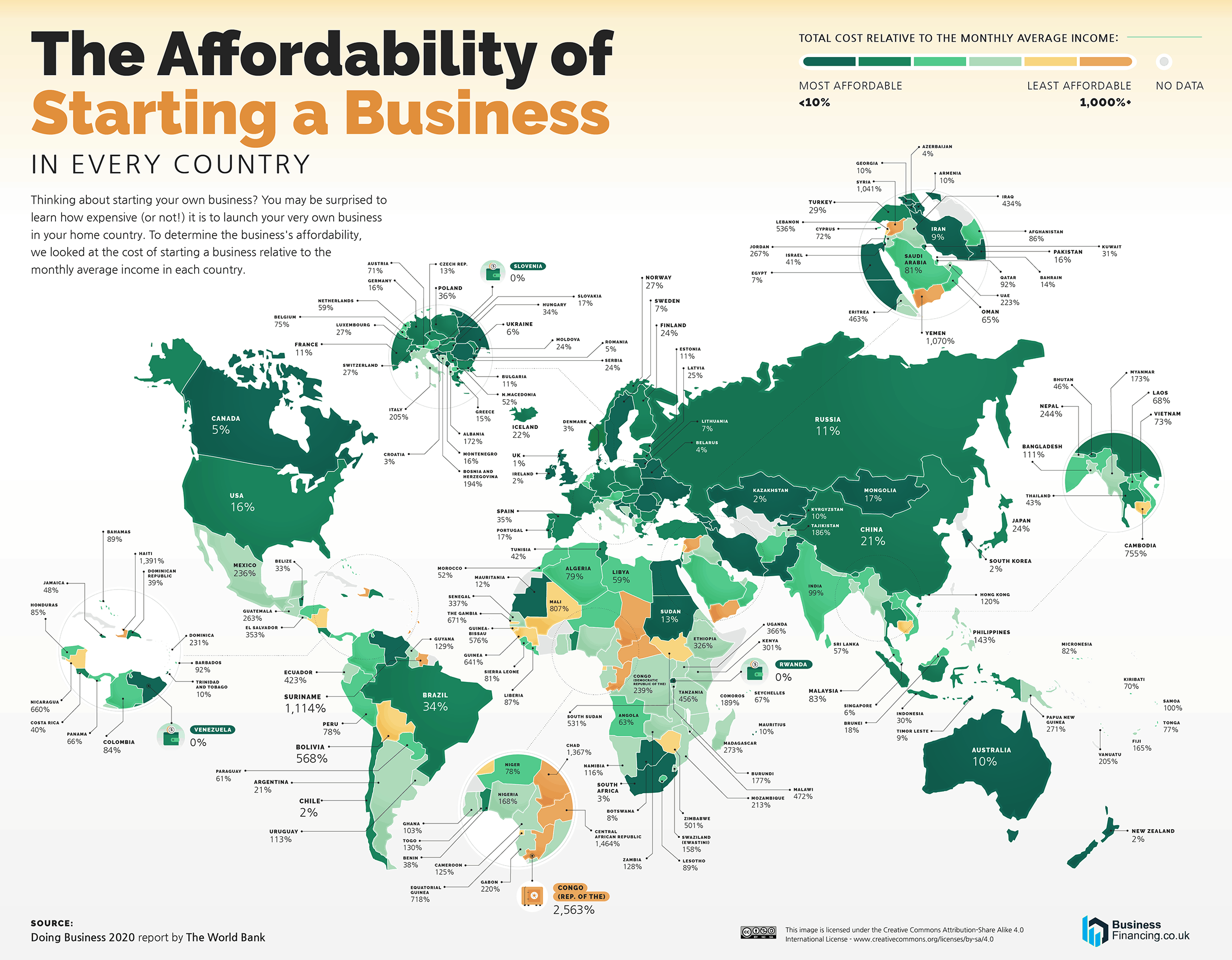
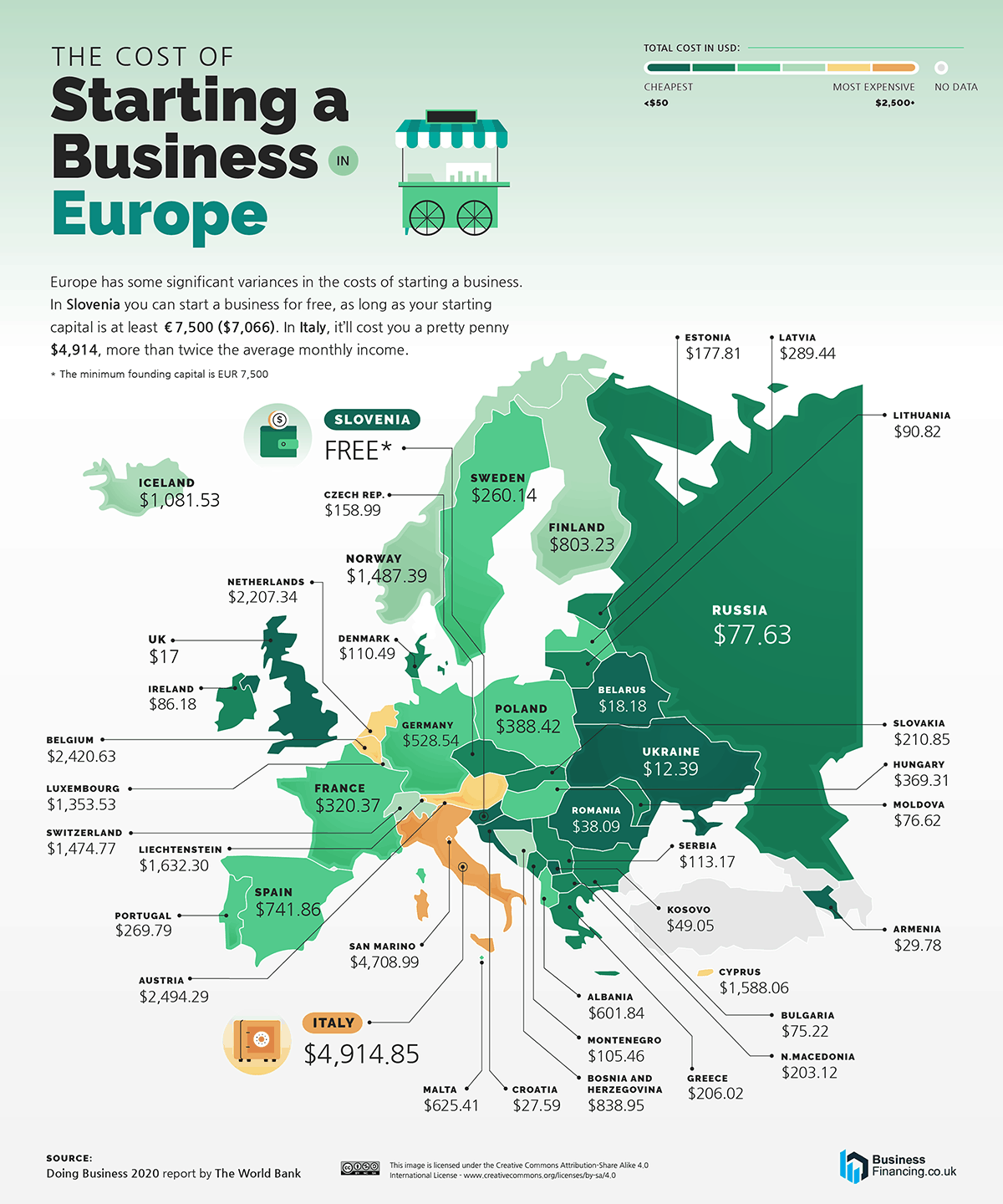
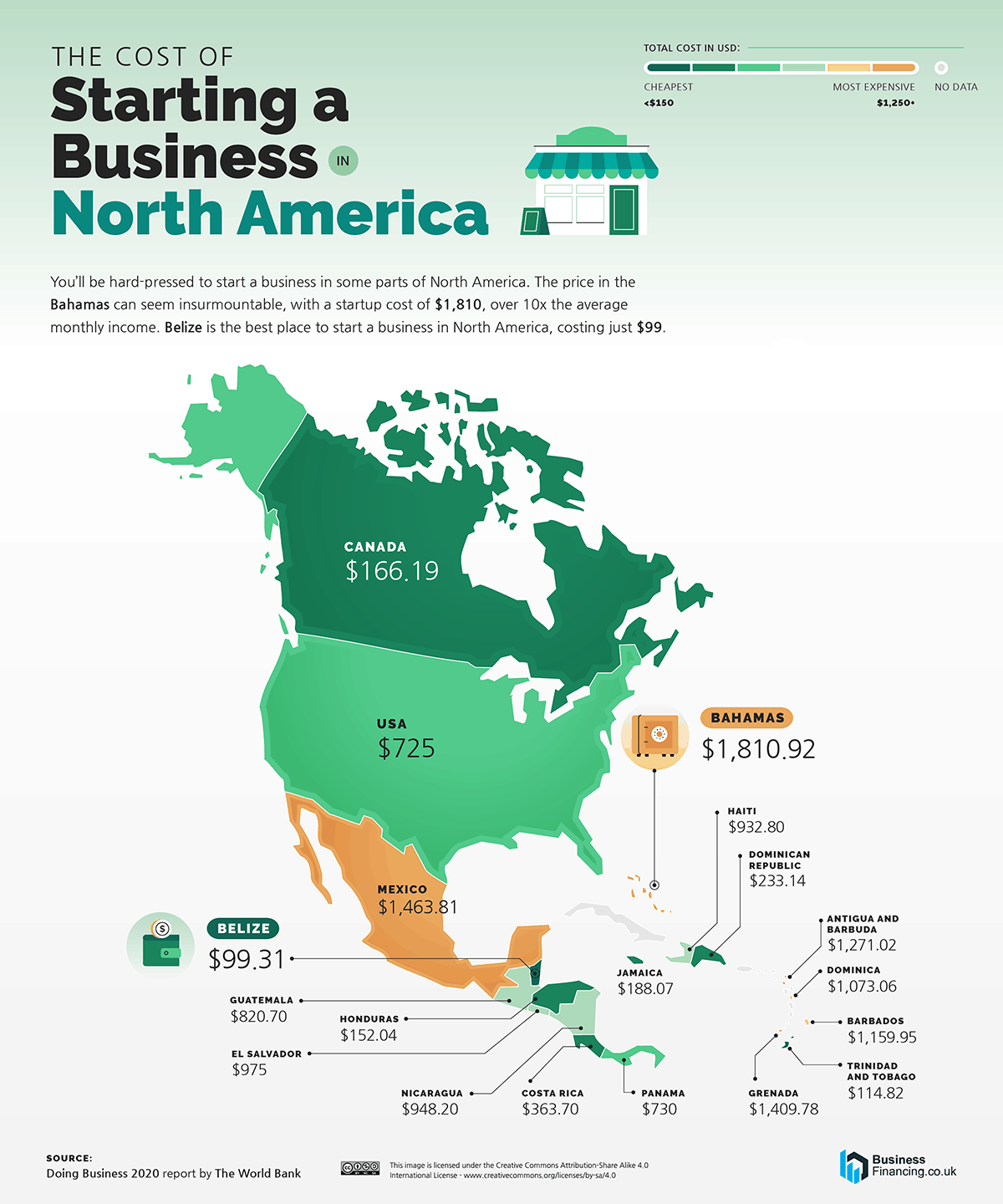
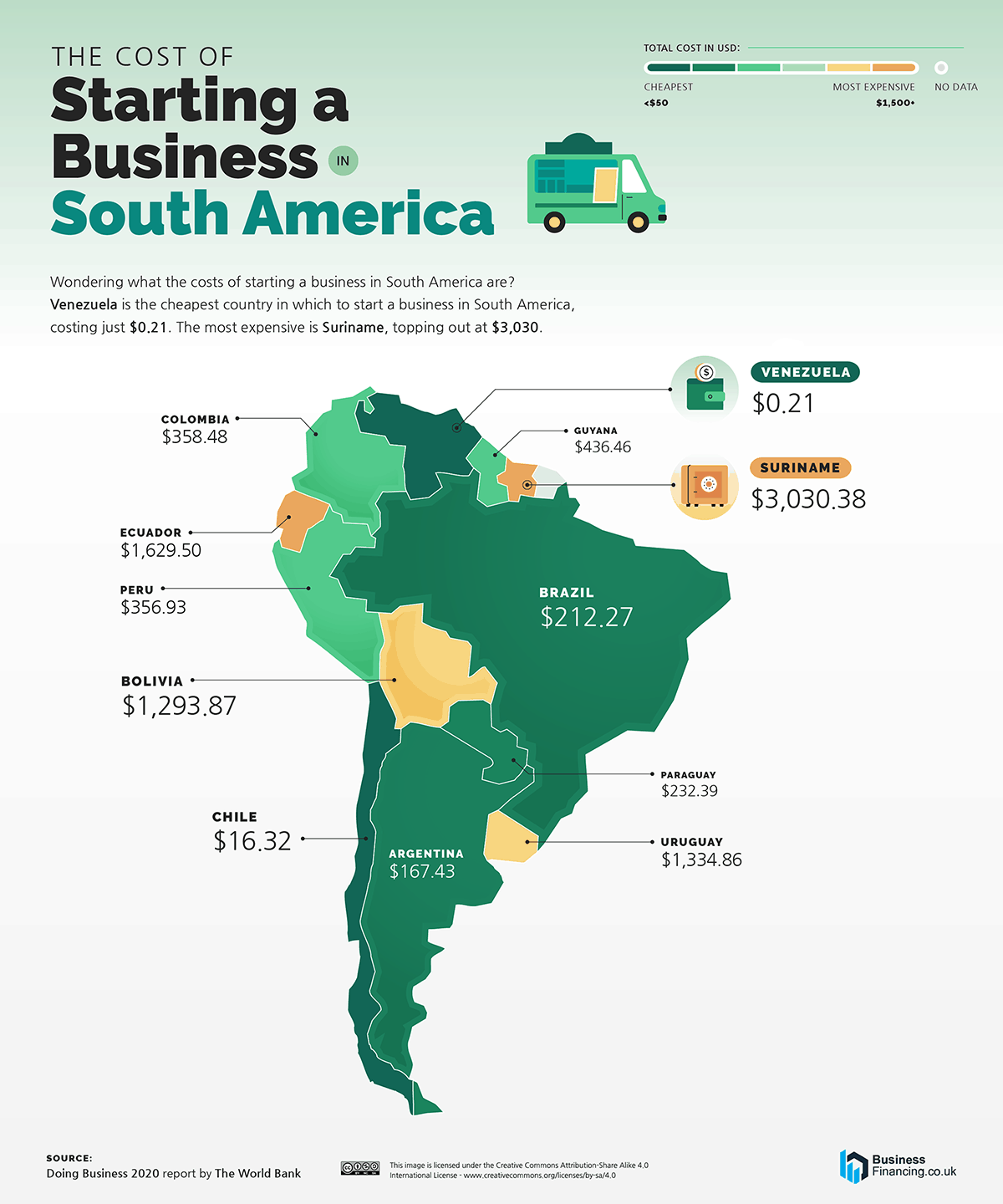
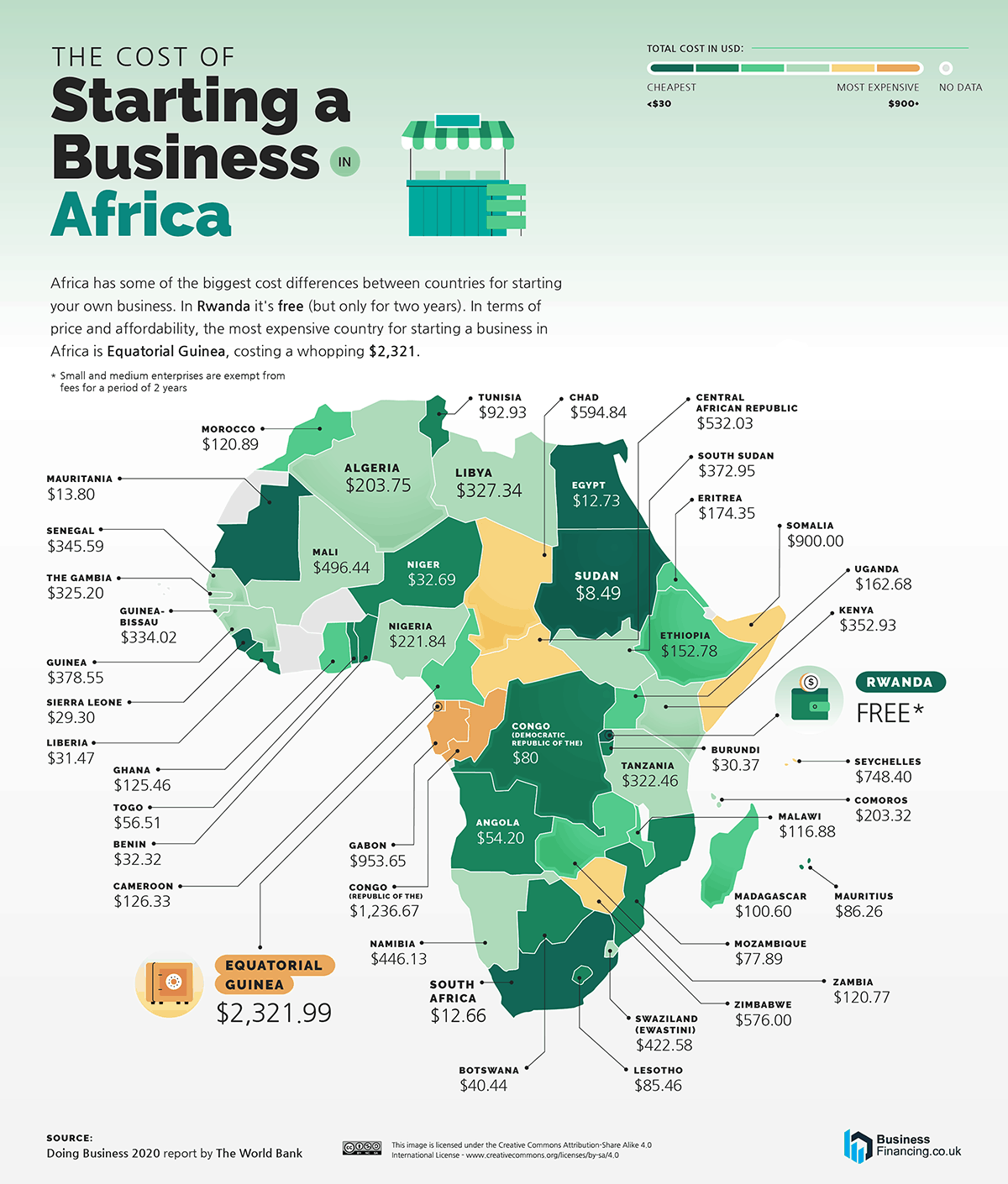

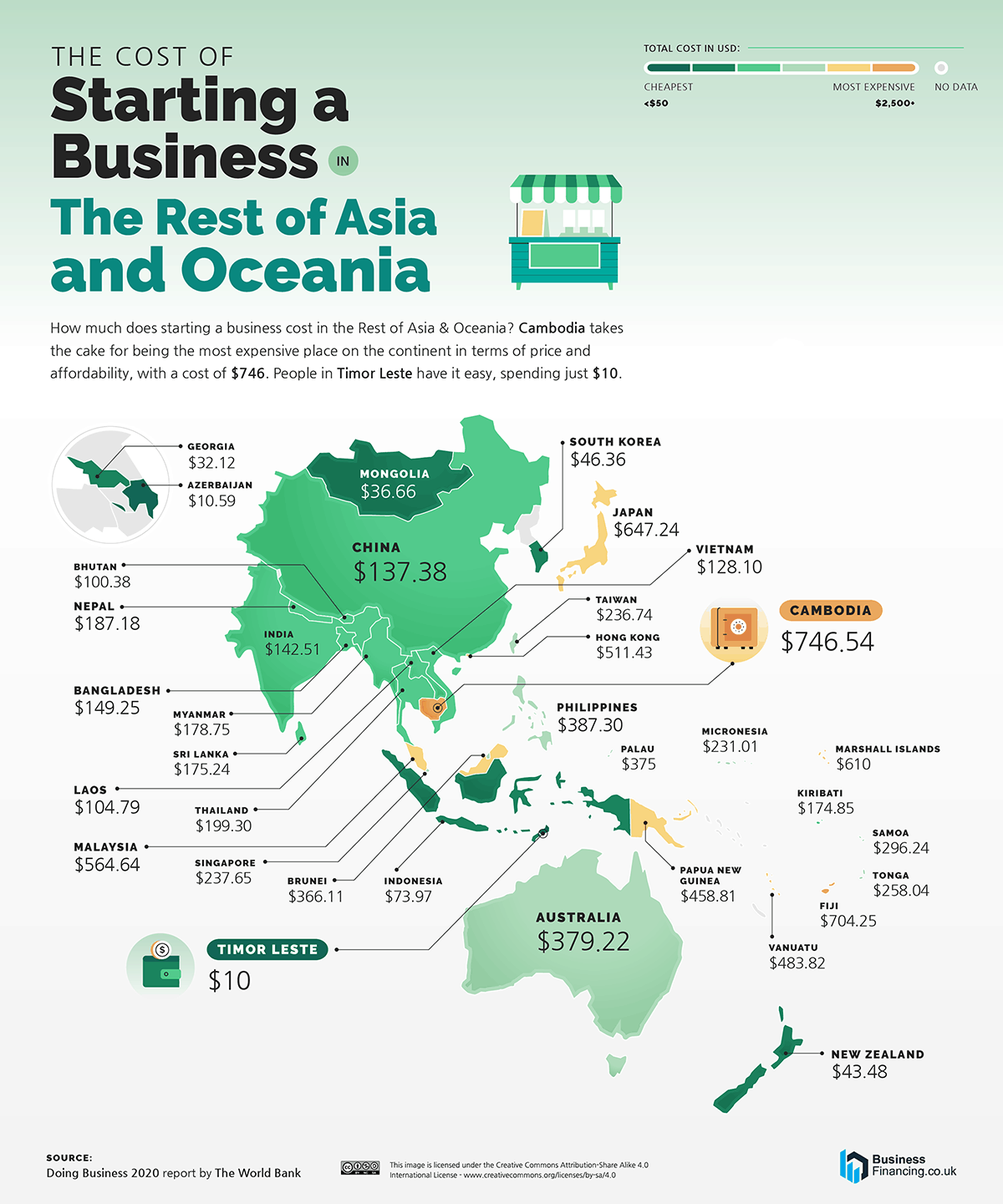
Val says
There is a country called Cape Verde.
Have you heard about it?
Llew Boddam-Whetham says
This is no longer correct in Fiji. Since the 2020 Budget, 12 months ago you can start a business by filling out an online application for zero cost and start your business.
Alexander A Goslat says
This is very valuable information. Though it may fluctuate it gives startups an idea of what to expect. Thanks for sharing.
Al-Uzd Al-Busaidi says
To whom it may concern,
Good day,
Im Al-uzd Al-Busaidi, a specialist at the SME development authority in the sultanate of Oman,
I would like to inquire about the methodology used to structure the report, and how the cost of doing business in Oman was calculated, After looking at the Doing business report 2020, and the sources mentioned, we believe that it may be inaccurate and would like to get a clearer idea about how the costs have been calculated, and how $500 came up as the cost of doing business in the Sultanate.
Looking forward to hear back from you,
Much appreciated
Regards,
Mustapha EL AAMRANI says
Hello dear,
I hope that you are doing well.
The moroccan map that you have used in the images is wrong, that’s affecte the credibility of the shared information.
Best regards,
Mustapha
Anass abouelfadl says
Totally agree.
Correct your maps please .the map you’ve shown cuts half of morocco
Abdellah BAAZZI says
please update the morocco map with the correct you can check in google map
David says
Would-be love to See elaborative estimations About “Protection fees” 🥸